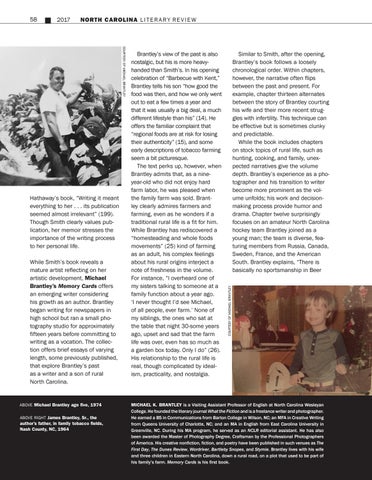2017
NORTH CAROLINA L I T E R A R Y RE V I E W
COURTESY OF MICHAEL BRANTLEY
Hathaway’s book, “Writing it meant everything to her . . . its publication seemed almost irrelevant” (199). Though Smith clearly values publication, her memoir stresses the importance of the writing process to her personal life. While Smith’s book reveals a mature artist reflecting on her artistic development, Michael Brantley’s Memory Cards offers an emerging writer considering his growth as an author. Brantley began writing for newspapers in high school but ran a small photography studio for approximately fifteen years before committing to writing as a vocation. The collection offers brief essays of varying length, some previously published, that explore Brantley’s past as a writer and a son of rural North Carolina.
ABOVE Michael Brantley age five, 1974 ABOVE RIGHT James Brantley, Sr., the
author’s father, in family tobacco fields, Nash County, NC, 1964
Brantley’s view of the past is also nostalgic, but his is more heavyhanded than Smith’s. In his opening celebration of “Barbecue with Kent,” Brantley tells his son “how good the food was then, and how we only went out to eat a few times a year and that it was usually a big deal, a much different lifestyle than his” (14). He offers the familiar complaint that “regional foods are at risk for losing their authenticity” (15), and some early descriptions of tobacco farming seem a bit picturesque. The text perks up, however, when Brantley admits that, as a nineyear-old who did not enjoy hard farm labor, he was pleased when the family farm was sold. Brantley clearly admires farmers and farming, even as he wonders if a traditional rural life is a fit for him. While Brantley has rediscovered a “homesteading and whole foods movements” (25) kind of farming as an adult, his complex feelings about his rural origins interject a note of freshness in the volume. For instance, “I overheard one of my sisters talking to someone at a family function about a year ago. ‘I never thought I’d see Michael, of all people, ever farm.’ None of my siblings, the ones who sat at the table that night 30-some years ago, upset and sad that the farm life was over, even has so much as a garden box today. Only I do” (26). His relationship to the rural life is real, though complicated by idealism, practicality, and nostalgia.
Similar to Smith, after the opening, Brantley’s book follows a loosely chronological order. Within chapters, however, the narrative often flips between the past and present. For example, chapter thirteen alternates between the story of Brantley courting his wife and their more recent struggles with infertility. This technique can be effective but is sometimes clunky and predictable. While the book includes chapters on stock topics of rural life, such as hunting, cooking, and family, unexpected narratives give the volume depth. Brantley’s experience as a photographer and his transition to writer become more prominent as the volume unfolds; his work and decisionmaking process provide humor and drama. Chapter twelve surprisingly focuses on an amateur North Carolina hockey team Brantley joined as a young man; the team is diverse, featuring members from Russia, Canada, Sweden, France, and the American South. Brantley explains, “There is basically no sportsmanship in Beer COURTESY OF MICHAEL BRANTLEY
58
MICHAEL K. BRANTLEY is a Visiting Assistant Professor of English at North Carolina Wesleyan College. He founded the literary journal What the Fiction and is a freelance writer and photographer. He earned a BS in Communications from Barton College in Wilson, NC; an MFA in Creative Writing from Queens University of Charlotte, NC; and an MA in English from East Carolina University in Greenville, NC. During his MA program, he served as an NCLR editorial assistant. He has also been awarded the Master of Photography Degree, Craftsman by the Professional Photographers of America. His creative nonfiction, fiction, and poetry have been published in such venues as The First Day, The Dunes Review, Wordriver, Bartleby Snopes, and Stymie. Brantley lives with his wife and three children in Eastern North Carolina, down a rural road, on a plot that used to be part of his family’s farm. Memory Cards is his first book.
